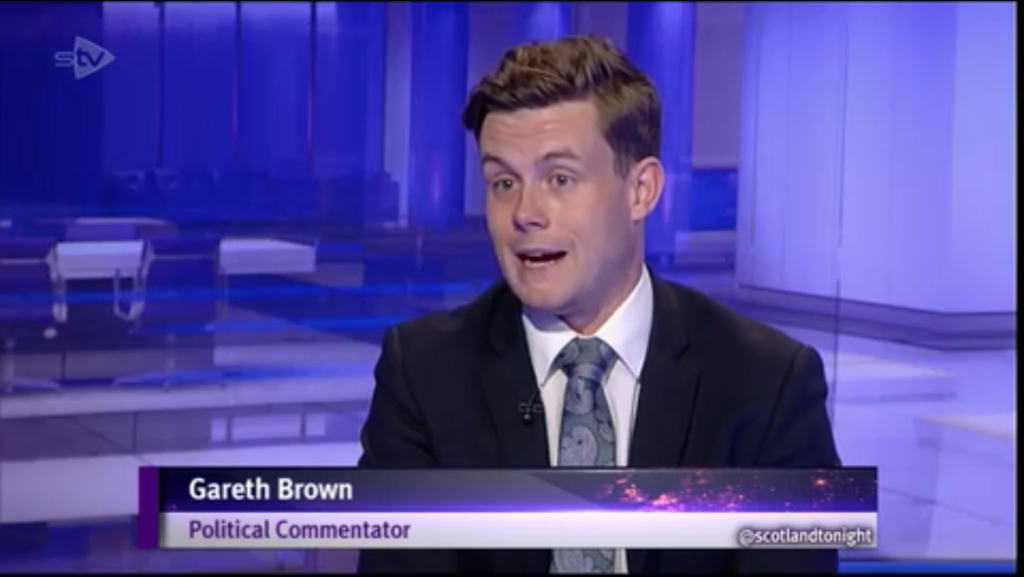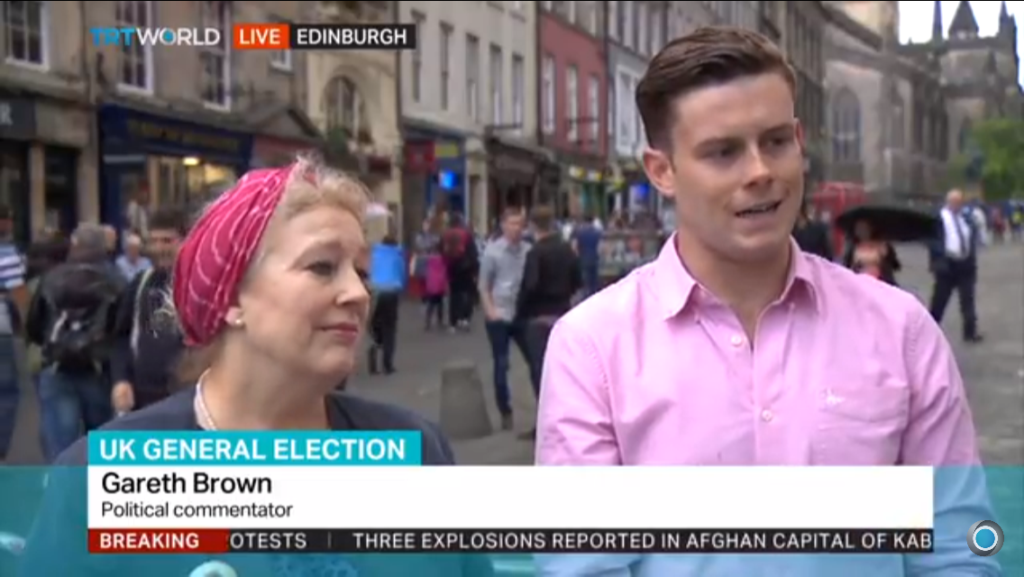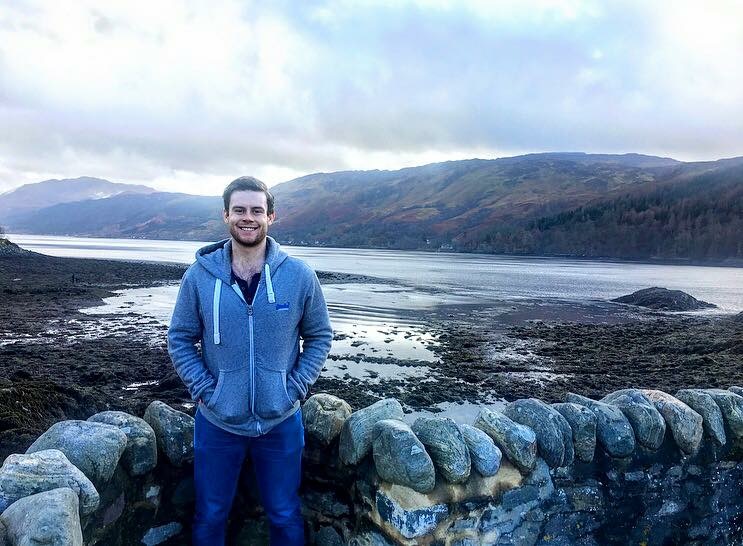In the latest of our Northern Roots series, where we speak to people originally from Northern Ireland but currently living elsewhere, our interviewee is Gareth Brown. You can follow Gareth on Twitter @garfbrown.
1. Tell us about yourself. When did you leave Northern Ireland, and where did you go? What do you do now?
I’m an Irish ex-pat living in Edinburgh, Scotland. I’ve lived and worked in Edinburgh for almost five years in a range of different political and communications roles including Head of Public Affairs and Communications for an NGO working with young people around political engagement and citizenship and a communications and media role in the Cabinet Office at the UK Government. I presently work as an Associate in a small, but growing, strategic communications and political relations firm. On occasion, I also provide some punditry on politics on current affairs programmes on Scottish television.
2. What do you think when you see the Northern Ireland of today, in the news and on social media?
On the one hand, we have Jekyll – a wonderful, charming country with great people and enormous potential. I can’t help but be struck by how vibrant Belfast and Derry have become as cities, even since I’ve left, and the ever enduring kindness and compassion of the people who live here. I hear nothing but supremely positive comments from friends and colleagues who visit Northern Ireland.
On the other hand, we have Hyde – I see a society that remains deeply divided on the margins, a centre that is fundamentally disengaged with the political process and an economy that cannot progress due to the same structural economic weaknesses that have existed for the last six decades. A generation of politicians have failed to embrace the actual ethos of power-sharing, despite occupying power-sharing structures, and lead our respective communities towards a reconciled, integrated society. The irony, of course, is that both political unionism and nationalism have done very little to advance a strategic and positive case for their own cause.
3. Are you hopeful for Northern Ireland’s future? Will Brexit make a difference?
I am, because I have to be – we all have to be. Otherwise, we might as well just give up.
A close friend and mentor of mine, and a former MLA and minister, used to always say to me that we should be “relentlessly positive” and it has always remained with me. For us to realise a better future it is incumbent on those of us who believe in it and have the means and capability to articulate it, to do so. We should all feel a deep responsibility in this sense.
I would be lying if I said I wasn’t profoundly concerned about Brexit, simply because I still believe the decision was the biggest act of national self-harm in modern political history. Although I think Brexit has reopened the question of Northern Ireland’s constitutional position within the UK, I think this has been grossly over-estimated (as it has been in Scotland) by nationalism – but hey, why let actual evidence get in the way of a politically expedient narrative?
I am slightly comforted by the emerging political consensus around Northern Ireland by both the UK and Europe, and as such I am confident that a solution will be found simply because it has to be.

4. Do you think you will return to Northern Ireland? What could convince you to come back?
Edinburgh, and Scotland more widely, is a wonderful place, although not without its own problems. I come home quite frequently for work, and simply because the geographical proximity to Scotland allows me to. Scotland and Ireland, and indeed Belfast and Edinburgh/Glasgow are very similar.
I do feel a real sense of longing when it comes to home, however. There is a big part of me that wants to play whatever small and limited role I can to make things better. I’m learning an enormous amount where I am just now, and I have a lot more to learn, but I am hopeful that someday an opportunity to make a difference in some way will present itself and I will have the right knowledge, skills and experience (and be in the right place in my own life) to take it.
5. What can Northern Ireland learn from the place you live now?
Unfortunately, Scotland’s politics has found itself in a deeply binary constitutional place over the last few years and it’s difficult to envisage how that changes in the foreseeable future. However, there is some very innovative and creative public policy-making.
To its credit, the SNP and the Scottish Government have sought to use devolution to its maximum potential (except on tax, although watch this space). Ministers, MSPs and the civil service embrace outside contributions and seek to build sectoral collaboration when designing and implementing policy. The outcome, generally speaking, is better law-making and better scrutiny of that law-making. I’ve always thought Northern Ireland could do the same if there was a mindset shift in the Northern Ireland Civil Service – although it takes its lead from an Executive *cue tumbleweed*.

6. If Northern Ireland had a president with sweeping powers, and it was you, what would you do?
Oh, this is not an easy one, and far be it for me to make suggestions.
I really want to say “find a way to deal with the past in an ethical and meaningful way”. There are so many families and victims awaiting truth and justice. I find it difficult to see how we can really progress as a society and economy until we do so. However, there are many more intelligent people than me, with a much deeper understanding of this issue, that have struggled with this very conundrum for a very long time.
One thing I am absolutely convinced about is the need to solve the cost of childcare to families and single parents. It can cost up to £1,000 per child per month for full time childcare in some instances.
This is one of the greatest public policy challenges of our age, and a huge problem in terms of the labour market, the gender pay gap, and the wider economy and society. However, it’s also a hugely important service that requires a motivated, skilled and well paid workforce in what are some of the most important years of our children’s lives in terms of physical and cognitive development. I wonder if we should bring childcare into statutory provision, and treat it as an extension of the education system. Although it’s a huge funding commitment, the resulting increase in tax revenue, productivity and wealth generation from more women and men returning to work earlier would go a significant way (in my view) to meet the bill.
I’ve also always wondered why we have five health trusts in Northern Ireland. Do we need five given the size of our population? Surely having one trust would release significant more resource into front line services (less chief executives and directors of finance and more doctors and nurses)? Although I may have to into hiding with that one, as we generally don’t really like public service reform in Northern Ireland.
7. What would you like to see more of on Northern Slant?
Reading the NS is one of those things that makes me feel at home away from home – and for that I’m hugely grateful. I think it is incumbent upon those of us to want to make a contribution to public discourse to present ideas and solutions as well as commentary on the status quo. I know many of your contributors are excellent at this, but I think it would be great to see more ideas.

8. If you could ask Northern Ireland politicians (past or present) to dinner, who would they be? And why?
John McAllister is a former unionist MLA, who I have always found to be an incredibly decent individual. I enjoyed working with him when I was doing my undergraduate dissertation on the potential for an opposition in Stormont a few years before he brought his Private Member’s Bill to the Assembly. I’ve always found him to be very down to earth, and I think he would be great dinner company.
Alex Attwood is a former senior SDLP politician and Minister. He is also a very close friend and mentor, and I always find our conversations stimulating and challenging.
I have always been fascinated by the life of Ian Paisley senior, and particularly the journey that we are told he travelled in terms of his relationship with devolution, and the wider nationalist movement. Since the Eamonn Mallie documentary on his life, not long before he passed away, I’ve always thought that it would be so interesting to hear this account from his wife, Baroness Eileen Paisley.
9. Do you have a favourite quote, or mantra?
There are so many quotes that I can relate to in A.A Milne’s Winnie the Poo, but I really enjoy this one: “It is more fun to talk with someone who doesn’t use long, difficult words but rather short, easy words like “What about lunch?”.
10. What’s your message for people back home?
Be relentlessly positive.

Also published on Medium.
